|
|
|
Sort Order |
|
|
|
Items / Page
|
|
|
|
|
|
|
| Srl | Item |
| 1 |
ID:
077612
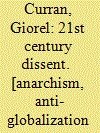

|
|
|
|
|
| Publication |
Hampshire, Palgrave Macmillan, 2006.
|
| Description |
xi, 251p.
|
| Standard Number |
9781403948816
|
|
|
|
|
|
|
|
|
|
|
|
Copies: C:1/I:0,R:0,Q:0
Circulation
| Accession# | Call# | Current Location | Status | Policy | Location |
| 052371 | 303.484/CUR 052371 | Main | On Shelf | General | |
|
|
|
|
| 2 |
ID:
113882
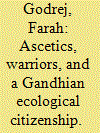

|
|
|
|
|
| Publication |
2012.
|
| Summary/Abstract |
I argue here that a clearer conception of Gandhi's nonviolence is required in order to understand his resonance for contemporary environmentalism. Gandhi's nonviolence incorporates elements of both the brahmin or ascetic, as well as the ksatriya or warrior. Contemporary environmental movements by and large over-emphasize the self-abnegating, self-denying and self-scrutinizing ascetic components of Gandhi's thought, to the neglect of the confrontational and warrior-like ones. In so doing, they often also over-emphasize the ethical dimension of Gandhi's thought, missing the discursive political dimension with which this Gandhian ethics is interwoven. I will argue here that the warrior-like and confrontational political aspect of Gandhi's nonviolence must be brought to the fore in discussions of environmentalism. In so doing, Gandhi can be read as an advocate of a certain form of "ecological" citizenship, requiring both the scrutiny of one's bodily consumptive behaviours, as well as the placement of one's body on the frontlines of aggressive political contestation.
|
|
|
|
|
|
|
|
|
|
|
|
|
|
|
|
| 3 |
ID:
146778
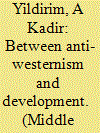

|
|
|
|
|
| Summary/Abstract |
As Turkey's Gezi Park protests reminded us, Islamist parties the world over demonstrate utter disregard of the environment in their discourse and actions. However, Islam as a religion places strong emphasis on environmental protection. Thus, as the representatives of Islam that these parties claim themselves to be, it is puzzling that environmental policy is all but absent from most Islamist platforms. I ask, what explains the poverty of Islamists in regards to the environment? I argue that the reason for this poverty is found within and conforms to political Islam's problematic relationship with modernity, particularly in regards to their strong anti-western sentiment and self-purported victim status. My findings suggest that the inattention Islamists give to the environment is due to their association of environmentalism with the West and because of the uniquely unfavourable socio-economic environments in which they exist, which sends environmentalism to the purview of ‘low politics’. This analysis points to an inherent weakness in Islamist ideology – their lack of pragmatic policy. Hence, the peculiar case of Islamists and the environment is but a symptom of a larger issue within Islamism and can be a key element to understanding why and how Islamism is likely to fail.
|
|
|
|
|
|
|
|
|
|
|
|
|
|
|
|
| 4 |
ID:
192178
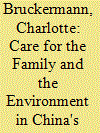

|
|
|
|
|
| Summary/Abstract |
In the “coal province” of Shanxi, residents grapple with tensions between caring for their families and caring about their environment. In creating ethical pathways through care, residents must navigate the paradox of livelihoods dependent on forms of development that endanger lives and pollute environments. This dilemma has crystallized over time, as the personal and particular demands of the present have become enmeshed with long-standing concerns over environmental degradation. Rather than characterizing family care as concrete and environmental care as abstract, acts of care in Shanxi link the reproductive crisis of the family with the reproductive crisis of the environment: the article presents instances under which the attention, empathy and recognition of care for concrete others are scaled up to the levels of ecology and planetary crisis.
|
|
|
|
|
|
|
|
|
|
|
|
|
|
|
|
| 5 |
ID:
078478
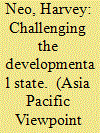

|
|
|
|
|
| Publication |
2007.
|
| Summary/Abstract |
Nature conservation efforts are often reactive to encroaching development plans and systematic conservation planning that is integral with development is not only uncommon, but is often fraught with difficulties even where it is actually attempted. Such obstacles to conservation are especially apparent in developmental states where state legitimacy is largely derived from the state's ability to develop the country. Among other things, developmental states place a premium on physical and economic development. This paper critiques, through the standpoint of nature conservation, the inadequate conceptualisation of `development' in the developmental state thesis. Specifically, this paper argues that the seemingly value-free (but ultimately economically based) underpinnings of development goals pushed by the developmental state needs to be tempered with a broader concern for the ethics of development. To that end, I draw on two case studies of nature conservation tussles in Singapore to show how alternative extra-economic visions of development have been articulated, notwithstanding the developmental state's monopoly on the discourse (and practice) of progress and development. The case studies, set in the heady economic growth of the early 1990s, will critique two related aspects of the developmental state: its `amoral' economistic conception of development and its use of growth and materialism as legitimacy
|
|
|
|
|
|
|
|
|
|
|
|
|
|
|
|
| 6 |
ID:
085894
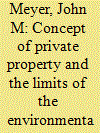

|
|
|
|
|
| Publication |
2009.
|
| Summary/Abstract |
An absolutist concept of property has the power to shape and constrain the public imagination. Libertarian theorists normatively embrace this concept. Yet its influence extends far beyond these proponents, shaping the views of an otherwise diverse array of theorists and activists. This limits the ability of environmentalists, among others, to respond coherently to challenges from property rights advocates in the U.S. I sketch an alternative concept-rooted in practice-that understands private property as necessarily embedded in social and ecological relations, rather than constrained by these relations. I argue that this concept can prefigure a more robust environmentalism.
|
|
|
|
|
|
|
|
|
|
|
|
|
|
|
|
| 7 |
ID:
173472
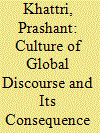

|
|
|
|
|
| Summary/Abstract |
Environmentalism as an ideology has gained currency in the contemporary globalized industrial world. As an ideology it advocates for environmental protection from the ill effects of human activities on its environment. The entire politics of climate change is an outcome of this ideology of environmentalism.
|
|
|
|
|
|
|
|
|
|
|
|
|
|
|
|
| 8 |
ID:
050289
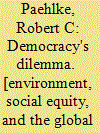

|
|
|
|
|
| Publication |
Cambridge, MIT Press, 2003.
|
| Description |
ix, 306p.
|
| Standard Number |
0262162156
|
|
|
|
|
|
|
|
|
|
|
|
Copies: C:1/I:0,R:0,Q:0
Circulation
| Accession# | Call# | Current Location | Status | Policy | Location |
| 047592 | 306.2/PAE 047592 | Main | On Shelf | General | |
|
|
|
|
| 9 |
ID:
086759
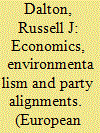

|
|
|
|
|
| Publication |
2009.
|
| Summary/Abstract |
'We are neither Left nor Right, we are out in front' was the mantra of the environmental movement in the 1970s and early 1980s. This research examines the relationship between the traditional left/right economic cleavage and the environmental cleavage in structuring party competition in advanced industrial democracies. It begins by discussing the theoretical rationale for the separation of environmentalism from the traditional economic cleavage, and utilises new expert data to describe the evolution of party positions between 1989 and 2002-2003. An initially strong relationship between party positions on both dimensions in 1989 has strengthened over time. The convergence occurs largely because of changes by Green parties and by the addition of new parties that define themselves on both dimensions. This points to the ability of democratic party systems to integrate a new political cleavage, and the process of integration. However, leftist parties still continue to diverge with respect to how they respond to the environmental cleavage.
|
|
|
|
|
|
|
|
|
|
|
|
|
|
|
|
| 10 |
ID:
086762
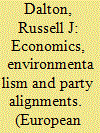

|
|
|
|
|
| Publication |
2009.
|
| Summary/Abstract |
'We are neither Left nor Right, we are out in front' was the mantra of the environmental movement in the 1970s and early 1980s. This research examines the relationship between the traditional left/right economic cleavage and the environmental cleavage in structuring party competition in advanced industrial democracies. It begins by discussing the theoretical rationale for the separation of environmentalism from the traditional economic cleavage, and utilises new expert data to describe the evolution of party positions between 1989 and 2002-2003. An initially strong relationship between party positions on both dimensions in 1989 has strengthened over time. The convergence occurs largely because of changes by Green parties and by the addition of new parties that define themselves on both dimensions. This points to the ability of democratic party systems to integrate a new political cleavage, and the process of integration. However, leftist parties still continue to diverge with respect to how they respond to the environmental cleavage.
|
|
|
|
|
|
|
|
|
|
|
|
|
|
|
|
| 11 |
ID:
114537
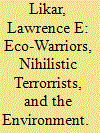

|
|
|
|
|
| Publication |
Santa Barbara, Praeger, 2011.
|
| Description |
xii, 274p.Hbk
|
| Standard Number |
9780313392368
|
|
|
|
|
|
|
|
|
|
|
|
Copies: C:1/I:0,R:0,Q:0
Circulation
| Accession# | Call# | Current Location | Status | Policy | Location |
| 056795 | 363.32593337/LIK 056795 | Main | On Shelf | General | |
|
|
|
|
| 12 |
ID:
056542
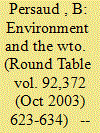

|
|
|
| 13 |
ID:
161167
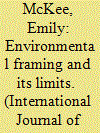

|
|
|
|
|
| Summary/Abstract |
As activists frame campaigns, their region's broader cultural and political context intercedes. In Israel and Palestine attempts to work across national lines and undertake activism that links ecological, economic, and social issues have long been stymied. This article examines how the fraught historical and contemporary relationships of Israelis and Palestinians with land bestow both flexibility and limitations on their framing of campaigns. In particular, it ethnographically analyzes the framing of two projects—the building of an “eco-mosque” and a Jordan River restoration effort—to examine how activists grapple with frame flexibility and its limits. It finds that an Israeli tendency to deterritorialize environmental issues and curb environmental campaigns that are “too political” conflicts with Palestinian criticism of apolitical frames because they euphemize violence and domination. These cases demonstrate how local connotations can make or break environmental campaigns. The eco-adage, “Think global, act local” is not enough. One must think local, too.
|
|
|
|
|
|
|
|
|
|
|
|
|
|
|
|
| 14 |
ID:
193587
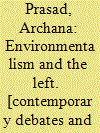

|
|
|
|
|
| Publication |
New Delhi, Left-Word Books, 2004.
|
| Description |
126p.pbk
|
| Standard Number |
8187496444
|
|
|
|
|
|
|
|
|
|
|
|
Copies: C:1/I:0,R:0,Q:0
Circulation
| Accession# | Call# | Current Location | Status | Policy | Location |
| 060494 | 333.7/PRA 060494 | Main | On Shelf | General | |
|
|
|
|
| 15 |
ID:
083975
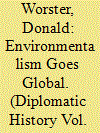

|
|
|
| 16 |
ID:
001343


|
|
|
|
|
| Publication |
Westport, Praeger, 1998.
|
| Description |
xx, 185p.
|
| Standard Number |
0275956008
|
|
|
|
|
|
|
|
|
|
|
|
Copies: C:1/I:0,R:0,Q:0
Circulation
| Accession# | Call# | Current Location | Status | Policy | Location |
| 040413 | 363.91/SMI 040413 | Main | On Shelf | General | |
|
|
|
|
| 17 |
ID:
188029
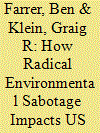

|
|
|
|
|
| Summary/Abstract |
In this paper we examine the impact of forceful or violent environmental sabotage (FVES) on U.S. elections. We argue that voters see ideological similarities between groups that engage in FVES and other nonviolent environmental organizations, like the Green Party. This means that when an environmentalist organization engages in FVES, it has a negative impact on voter attitudes toward all environmental organizations. Moreover, this negative impact will be stronger if environmentalists had previously made electoral progress, and so they cannot use the excuse that democratic methods had failed and they were forced to turn to FVES. We demonstrate this by showing that when FVES occurs, Green Party candidates tend to win a lower share of the vote in the next election. However, this effect is conditional on the prior electoral history of the Green Party. If the Green Party has a poor electoral record, then sabotage has little effect, but if the Green Party has a better electoral record, then voters are less forgiving of sabotage. We find no evidence that FVES effects Republican or Democratic vote shares. We conclude that different organizations within the same social movement are connected in ways that impact electoral outcomes.
|
|
|
|
|
|
|
|
|
|
|
|
|
|
|
|
| 18 |
ID:
139121
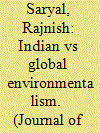

|
|
|
| 19 |
ID:
142191
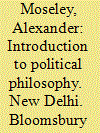

|
|
|
|
|
| Publication |
New Delhi, Bloomsbury Publishing India, 2016.
|
| Description |
202p.pbk
|
| Standard Number |
9789385436970
|
|
|
|
|
|
|
|
|
|
|
|
Copies: C:1/I:0,R:0,Q:0
Circulation
| Accession# | Call# | Current Location | Status | Policy | Location |
| 058397 | 320.01/MOS 058397 | Main | On Shelf | General | |
|
|
|
|
| 20 |
ID:
080345
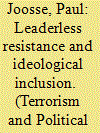

|
|
|
|
|
| Publication |
2007.
|
| Summary/Abstract |
Leaderless resistance is a strategy of opposition that allows for and encourages individuals or small cells to engage in acts of political violence entirely independent of any hierarchy of leadership or network of support. This article examines the development of the leaderless resistance strategy by the radical right and more recently by the radical environmentalist movement. While both movements use leaderless resistance to avoid detection, infiltration, and prosecution by the state, environmental groups like the Earth Liberation Front (ELF) benefit additionally because of the ideological inclusiveness that leaderless resistance fosters. Historically, ideological cleavages have rendered radical environmental groups such as Earth First! less effective than they would have been otherwise. Using leaderless resistance, however, the ELF eliminates all ideology extraneous to the specific cause of halting the degradation of nature. This elimination enables the ELF to mobilize a greater number of "direct actions
|
|
|
|
|
|
|
|
|
|
|
|
|
|
|
|
|
|
|
|
|